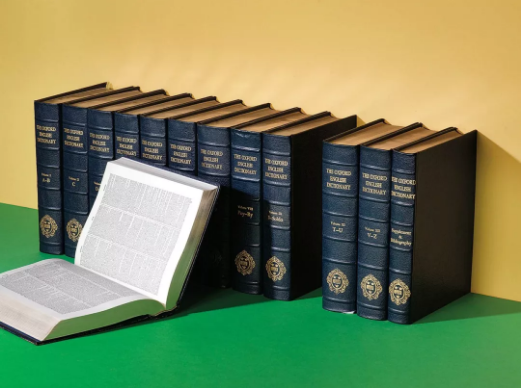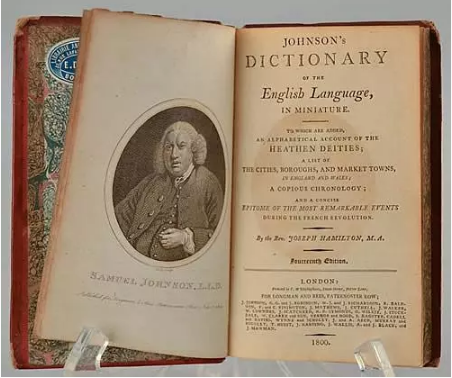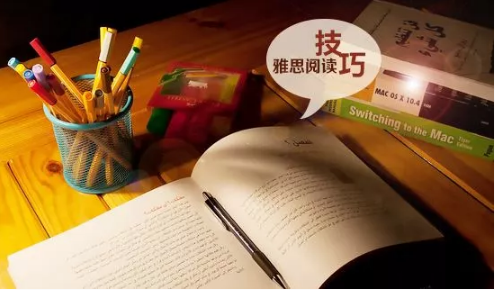摘要:文章推荐:本文是语言学主题的文章,为雅思阅读常见的主题。难度中等,但很多学生对该主题较为陌生。精读本文对理解这类话题的文章大有益处。本文后面附雅思阅读剑五真题(Johnson’s dictionary)一篇,如已读过,可自行忽略。
文章推荐:本文是语言学主题的文章,为雅思阅读常见的主题。难度中等,但很多学生对该主题较为陌生。精读本文对理解这类话题的文章大有益处。本文后面附雅思阅读剑五真题(Johnson’s dictionary)一篇,如已读过,可自行忽略。
Johnson——Word-birth

How words come to be used tells you a lot about different cultures
WHERE do new words come from? Few are purely invented, in the sense of being coined from a string of sounds chosen more or less at random. Most tend to be existing words given new meaning (“to tweet”). In other cases, a word changes its parts of speech (“to Photoshop”, “to Facebook”). And in some of the most creative instances, people chop words and recombine them to make new ones (as in “sexting”).
New words mostly become embedded through use. A few countries have official academies that declare when a word has been accepted, but they have little actual influence over how people speak. Which words make their way into a language says a lot about where phrasing comes from today.

One such official regulator is the Dansk Sprognaevn, which has the humble task of determining official spelling in Danish. Many Danes take the body’s decision to include this or that word in its spelling dictionaries as a sign that it is a “real” word. “New Danish Words, With Origin” a book by Jorgen Norby Jensen, shows how rarely new Danish forms are created by Danes from Danish roots for specifically Danish circumstances. Instead, the great majority come, one way or another, from English.
The obvious examples are those that are borrowed wholesale. Mr. Jensen offers “foodie”, “selfie”, “clickbait”, “blog”, “Brexit” and “twerking” (a kind of bot- tom-waggling dance). Only slightly more disguised are those words whose spelling has been changed, like metroseksuel. Some are altered for Danish grammar norms, likeoute, the verb “to out some- one as gay”. (Danish verbs mostly require an “-e” at the end.)
Words of more exotic origin include “emoji” and “barista”, which have their origins in Japanese and Italian. But these too, Mr. Jensen writes, come via English, not directly from those languages. This route is more common, it seems, than that of “quinoa”, which was borrowed directly from Spanish (which itself took the word from Quechua).
In another category are “English” words and expressions that are unknown to Anglophones. Danes have long said that someone who is fresh and ready to go is “fit for fight”. Another is “facerape”, which means to hack someone’s social-media profile in order to fiddle with its personal- information settings or to post fake status updates. Such faux-anglicisms are com- mon in other languages too: the German Handy (mobile phone) or Kicker (table foot- ball), or the French tennisman and tennis- woman. Linguistic experts in these countries decry these words—it is bad enough to have to borrow English words, but even worse to counterfeit them, they reckon. But they cannot seem to stop them.

But the book of new Danish words shows an even deeper kind of influence. Even where words appear Danish, they are often simply part-for-part translations of English words: vejvrede is “road rage”, undskyld mit franske is “pardon my French”, and svingvaelger, “swing voter”. This shows that globalisation is not only in the surface traffic of words, but in the deeper exchange of concepts.
This is not to say that other languages do not creatively coin their own words anymore. In Denmark an amagernum merplade or “Amager number-plate” is a tattoo on the lower back, named after a once-tatty bit of Copenhagen. Svenskerhar and bundesligahar, “Swede hair” or “Bundesliga hair”, both refer to the cut known in English as a mullet. And curlingforaeldre, “curling parents”, is an interesting twist on “helicopter parents”: rather than hovering over their children, they sweep all obstacles out of their way, as in the eponymous sport.
So English borrowing is not entirely replacing native creativity, even if the heavy thumbprint of English on virtually every language in the globalised world is increasingly clear. This is not because English is particularly supple, wonderful or flexible in itself; it is more to do with the influence of innovations from the Anglosphere, from the good (blogs) to the ridiculous(twerking).
It may be that the spread of concepts from English out, rather than the other way round, is in fact to the discredit of the English-speaking world. Words spread from English because people learn English; cultural secrets from quinoa to hygge are more likely to be buried in other cultures where outsiders cannot find them. Perhaps the Anglophones are the real losers in this exchange.

延伸阅读(剑五 Test 1 Passage 1)
Johnson's Dictionary
For the century before Johnson's Dictionary was published in 1775. There had been concern about the state of the English language. There was no standard way of speaking or writing and no agreement as to the best way of bringing some order to the chaos of English spelling. Dr. Johnson provided the solution.
There had, of course, been dictionaries in the past, the first of these being a little book of some 120 pages, compiled by a certain Robert Cawdray, published in 1604 under the title A Table Alphabetical! 'Of hard usual English words'. Like the various dictionaries that came after it during the seventeenth century, Cawdray's tended to concentrate on 'scholarly' words; one function of the dictionary was to enable its student to convey an impression of fine learning.
Beyond the practical need to make order out of chaos, the rise of dictionaries is associated with the rise of the English middle class, who were anxious to define and circumscribe the various worlds to conquer- lexical as well as social and commercial. It is highly appropriate that Dr. Samuel Johnson, the very model of an eighteenth-century literary man. As famous in his own time as in ours, should have published his Dictionary at the very beginning of the heyday of the middle class.

Johnson was a poet and critic who raised common sense to the heights of genius. His approach to the problems that had worried writers throughout the late seventeenth and early eighteenth centuries was intensely practical. Up until his time, the task of producing a dictionary on such a large scale had seemed impossible without the establishment of an academy to make decisions about right and wrong usage Johnson decided he did not need an academy to settle arguments about language; he would write a dictionary himself; and he would do it single-handed. Johnson signed the contract for the Dictionary with the bookseller Robert Dosley at a breakfast held at the Golden Anchor Inn near Holborn Bar on 18 June 1764. He was to be paid £ 1.575 in installments, and from this he took money to rent 17 Gough Square, in which he set up his 'dictionary workshop'.
James Boswell, his biographer described the garret where Johnson worked as 'fitted up like a counting house' with a long desk running down the middle at which the copying clerks would work standing up. Johnson himself was stationed on a rickety chair at an old crazy deal table' surrounded by a chaos of borrowed books. He was also helped by six assistants, two of whom died whilst the Dictionary was still in preparation.
The work was immense; filling about eighty large notebooks (and without a library to hand). Johnson wrote the definitions of over 40,000 words, and illustrated their many meanings with some I 14.000 quotations drawn from English writing on every subject, from the Elizabethans to his own time. He did not expect to achieve complete originality, working to a deadline. He had to draw on the best of all previous dictionaries, and to make his work one of heroic synthesis, In fact it was very much more. Unlike his predecessors, Johnson treated English very practically, as a living language, with many different shades of meaning. He adopted his definitions on the principle of English common law-according to precedent after its publication; his Dictionary was not seriously rivaled for over a century.

After many vicissitudes the Dictionary was finally published on 15 April 1775. It was instantly recognised as a landmark throughout Europe. 'This very noble work.' wrote the leading Italian lexicographer will be a perpetual monument of Fame to the Author an Honor to his own Country in particular, and a general Benefit to the republic of Letters throughout Europe.' The fact that Johnson had taken on the Academies of Europe and matched them (everyone knew that forty French academics had taken forty years to produce the first French national dictionary) was cause for much English celebration.
Johnson had worked for nine years with little assistance of the learned, and without any patronage of the great not in the soft obscurities of retirement, or under the shelter of academic bowers, but amidst inconvenience and distraction, in sickness and in sorrow'. For all its faults and eccentricities his two-volume work is a masterpiece and a landmark, in his own words, 'setting the orthography displaying the analogy, regulating the structures, and ascertaining the significations of English words'. It is the cornerstone of Standard English, an achievement which, in James Boswell's words, ‘conferred stability on the language of his country'.
The Dictionary, together with his other writing, made Johnson famous and so well esteemed that his friends were able to prevail upon King George III to offer him a pension. From then on, he was to become the Johnson of folklore.

文章精读:
Johnson --- Word-birth
How words come to be used tells you a lot about different cultures
黄色部分为重点单词
红色为精选句子
(本文主要内容是语言中单词是怎么被创造出来,以及英文在全球化之下对其他语言的影响。)
WHERE do new words come from? Few are purely invented, in the sense of being coined from a string of sounds chosen more or less at random. Most tend to be existing words given new meaning (“to tweet”). In other cases, a word changes its parts of speech (“to Photoshop”, “to Facebook”). And in some of the most creative instances, people chop words and recombine them to make new ones (as in “sexting”).
· coin v.创造,杜撰(新词或短语)
e.g. Jaron Lanier coined the term 'virtual reality' and pioneered its early development
杰伦·拉尼尔创造了“虚拟现实”这个词,并成为推动其早期发展的先驱人物。
· a string of 一连串的,一系列
e.g. a string of corruption scandals 一系列贪腐丑闻
· at random 随意
e.g. She opened the book at random and started reading.
她随意翻开书就看了起来。
原文例句:
Few are purely invented, in the sense of being coined from a string of sounds chosen more or less at random.
注:invent =coin 创造
翻译:很少有词是纯粹被创造出来的,也即并非随意从一连串发音中选择造词这种意义上创造出来。
· tend to 倾向于…
原文例句:
Most tend to be existing words given new meaning (“to tweet”).
翻译:大部分(词)往往都是现有的单词被赋予新的含义(‘推特’)。
相关词:
intend to …打算…
pretend to… 假装…
· recombine v.重组
原文例句:
And in some of the most creative instances, people chop words and recombine them to make new ones (as in “sexting”).
翻译:在某些情形中,人们极富创造性地将单词拆开,重新组合成新单词(比如‘sexting’)。

New words mostly become embedded through use. A few countries have official academies that declare when a word has been accepted, but they have little actual influence over how people speak. Which words make their way into a language says a lot about where phrasing comes from today.
· embed v.使嵌入,使(思想)扎根于
e.g. The fossils at Dinosaur Cove are embedded in hard sandstones.
恐龙峡谷中的化石都嵌在坚硬的砂岩中。
· academy n.研究院
原文例句:
A few countries have official academies that declare when a word has been accepted, but they have little actual influence over how people speak.
翻译:有几个国家开设官方研究院会在一个新词被接受时公开宣布,但是对人们如何讲话没有什么实际的影响。
· make one’s way into…进入
原文例句:
Which words make their way into a language says a lot about where phrasing comes from today.
翻译:哪些词进入语言说明了今天的表达是从哪里来。
One such official regulator is the Dansk Sprognaevn, which has thehumble task of determining official spelling in Danish. Many Danes take the body’s decision to include this or that word in its spelling dictionaries as a sign that it is a “real” word. “New Danish Words, With Origin” a book by Jorgen Norby Jensen, shows how rarely new Danish forms are created by Danes from Danish roots for specifically Danish circumstances. Instead, the great majority come, one way or another, from English.
· humble adj.微不足道的,不大的;谦虚的
e.g. There are restaurants, both humble and expensive, that specialize in them
专门做这些菜的餐馆既有毫不起眼的也有价格昂贵的。
原文例句:
One such official regulator is the Dansk Sprognaevn, which has the humble task of determining official spelling in Danish.
翻译:其中一个正式的监管机构是Dansk Sprognaevn,确定丹麦的官方拼音是它的一个小任务。
· specifically adv.特别
· one way or another 以某种方法,无论如何
原文例句:
“New Danish Words, With Origin” a book by Jorgen Norby Jensen, shows how rarely new Danish forms are created by Danes from Danish roots for specifically Danish circumstances. Instead, the great majority come, one way or another, from English.
翻译:一本由Jorgen Norby Jensen写的书《新版丹麦单词及词源》,表明丹麦人很少使用丹麦词根为特定丹麦语境创造新形式的丹麦语。绝大多少都是来自英语。

The obvious examples are those that are borrowed wholesale. Mr. Jensen offers “foodie”, “selfie”, “clickbait”, “blog”, “Brexit” and “twerking” (a kind of bot- tom-waggling dance). Only slightly more disguised are those words whose spelling has been changed, like metroseksuel. Some arealtered for Danish grammar norms, like oute, the verb “to out someone as gay”. (Danish verbs mostly require an “-e” at the end.)
· wholesale adv.大量地,大批地 adj.大规模的 n.批发
相关:retail 零售
原文例句:
The obvious examples are those that are borrowed wholesale.
最明显的例子是那些大量借用自(英语)的单词。
· disguise v.伪装,假扮
e.g. Maybe you could disguise yourself as a waiter and sneak in there.
或许你可以假扮成一个侍者混进去。
原文例句:
Only slightly more disguised are those words whose spelling has been changed, likemetroseksuel.
翻译:稍微有些不明显的是那些拼写形式已改变的单词,如metroseksuel.
· alter v.改变
相关词:
alternative adj.可替代的,供选择的
alternate adj.交替的,轮流的
原文例句:
Some are altered for Danish grammar norms, like oute, the verb “to out someone as gay”. (Danish verbs mostly require an “-e” at the end.)
翻译:有些根据丹麦语法形式改变,像oute,是动词‘出柜’的意思。(丹麦动词大多数结尾加-e。
Words of more exotic origin include “emoji” and “barista”, which have their origins in Japanese and Italian. But these too, Mr. Jensen writes, come via English, not directly from those languages. This route is more common, it seems, than that of “quinoa”, which was borrowed directly from Spanish (which itself took the word from Quechua).
· exotic adj.外国的,外来的
原文例句:
Words of more exotic origin include “emoji” and “barista”, which have their origins in Japanese and Italian.
翻译:更多外来源头的单词包括“emoji”和“barista”,这些单词分别来自日语和意大利语。
· via prep.通过
原文例句:
But these too, Mr. Jensen writes, come via English, not directly from those languages.
翻译:但是Mr. Jensen写到,这些(词)也是通过英语而不是直接从那些语言(日语或意大利语)过来的。
注:via= through, by way of
e.g. Mr Baker will return home via Britain and France.
贝克先生将取道英国和法国回国。
In another category are “English” words and expressions that are unknown to Anglophones. Danes have long said that someone who is fresh and ready to go is “fit for fight”. Another is “facerape”, which means to hack someone’s social-media profile in order to fiddle with its personal-information settings or to post fake status updates. Such faux-anglicisms are common in other languages too: the German Handy (mobile phone) or Kicker (table foot- ball), or the French tennisman and tenniswoman. Linguistic experts in these countries decry these words—it is bad enough to have to borrow English words, but even worse to counterfeit them, they reckon. But they cannot seem to stop them.
· category n.范畴,类别
e.g. Voters fall into three main categories.
选民分为三大类。
原文例句:
In another category are “English” words and expressions that are unknown to Anglophones. Danes have long said that someone who is fresh and ready to go is “fit for fight”.
翻译:母语是英语者所不知道的‘英语’单词和短语是另一个范畴。丹麦人很早就把精神充沛的人称为“适合打斗”(的人)。
· fiddle with 玩弄,摆弄
原文例句:
Another is “facerape”, which means to hack someone’s social-media profile in order to fiddle with its personal-information settings or to post fake status updates.
翻译:另一个例子是‘facerape’(不解释),意思是黑进一个人的社交媒体资料去胡乱篡改个人信息设定,或者公布虚假的个人更新状态。
· decry v.谴责,责难
原文例句:
Linguistic experts in these countries decry these words—it is bad enough to have to borrow English words, but even worse to counterfeit them, they reckon.
翻译:这些国家的语言们反对这些单词,他们认为从英文单词借用本身就很糟糕,那么去伪造这些词就更糟糕了。
注:decry =condemn 谴责
counterfeit= fake 伪造
reckon 认为
e.g. It is a crime to counterfeit money.
伪造钱币是犯罪行为。

But the book of new Danish words shows an even deeper kind of influence. Even where words appear Danish, they are often simply part-for-part translations of English words: vejvrede is “road rage”, undskyld mit franske is “pardon my French”, and svingvaelger, “swing voter”. This shows that globalisation is not only in the surface traffic of words, but in the deeper exchange of concepts.
· traffic n.交流,交换 在此句中等于exchange
原文例句:
This shows that globalisation is not only in the surface traffic of words, but in the deeper exchange of concepts.
翻译:这表明全球化不仅仅是单词表面的交流,而是更深层次概念的交流。
This is not to say that other languages do not creatively coin their own words anymore. In Denmark an amagernum merplade or “Amager number-plate” is a tattoo on the lower back, named after a once-tatty bit of Copenhagen. Svenskerhar and bundesligahar, “Swede hair” or “Bundesliga hair”, both refer to the cut known in English as a mullet. And curlingforaeldre, “curling parents”, is an interesting twist on “helicopter parents”: rather than hovering over their children, they sweep all obstacles out of their way, as in the eponymous sport.
· tattoo n.纹身
e.g. He has a tattoo of a snake on his left arm.
他的左臂上刺了一条蛇。
· tatty adj.破旧的,简陋的
· helicopter parents 直升机父母
用来指那些过分关注孩子生活中的经历和问题的父母,他们对孩子的学校生活尤其关注。他们像直升飞机一样整天盘旋在孩子的身边,时刻等待孩子的召唤。
· sweep all obstacles out of their way 为他们扫除一切障碍
· eponymous 齐名的
原文例句:
And curlingforaeldre, “curling parents”, is an interesting twist on “helicopter parents”: rather than hovering over their children, they sweep all obstacles out of their way, as in the eponymous sport.
翻译:“冰壶父母”是“直升机父母”的一个有趣衍生:这些父母就像与之同名的体育项目一样,为孩子们扫除一切障碍,而不是盘旋在自己孩子身边。
So English borrowing is not entirely replacing native creativity, even if the heavy thumbprint of English on virtually every language in the globalised world is increasingly clear. This is not because English is particularlysupple, wonderful or flexible in itself; it is more to do with the influence of innovations from the Anglosphere, from the good (blogs) to the ridiculous(twerking).
· thumbprint 指纹,痕迹,特征
原文例句:
So English borrowing is not entirely replacing native creativity, even if the heavy thumbprint of English on virtually every language in the globalised world is increasingly clear.
翻译:因此,借用英文并不会完全取代本土创造力,即使在全球化的世界背景下,英语在几乎每种语言中的痕迹日益明显。
· supple adj.灵活的,柔软的,逢迎的
原文精句:
This is not because English is particularly supple, wonderful or flexible in itself; it is more to do with the influence of innovations from the Anglosphere, from the good (blogs) to the ridiculous(twerking).
翻译:这并不是因为英语本身特别灵活或是很奇妙;更多是因为来自英语文化圈,从好的(博客)到可笑的(电臀舞)等创新的影响。
It may be that the spread of concepts from English out, rather than the other way round, is in fact to the discredit of the English-speaking world. Words spread from English because people learn English; cultural secrets from quinoa to hygge are more likely to be buried in other cultures where outsiders cannot find them. Perhaps the Anglophones are the real losers in this exchange.
· the other way round 相反地
原文例句:
It may be that the spread of concepts from English out, rather than the other way round, is in fact to the discredit of the English-speaking world.
翻译:可能是从英语来的概念的传播,而不是相反,实际上是对英语世界的损坏。
单词/词组回顾
coin v. 创造,杜撰
category n.范畴,类别
embed v. 使嵌入,使(思想)扎根于
exotic adj.外国的,外来的
disguise v.伪装,假扮
alter v.改变
via prep.通过
exotic adj.外国的,外来的
specifically adv.特别地
supple adj.灵活的,柔软的,逢迎的
thumbprint n.指纹,痕迹,特征
eponymous adj.齐名的
decry v.谴责,责难
fiddle with 玩弄,摆弄
sweep all obstacles out of their way 为他们扫除一切障碍
one way or another 以某种方法,无论如何
the other way round 相反地
a string of 一连串
make one’s way into 进入
本文作者简介:

王少娟
上海新航道雅思主讲,上海外国语大学教育技术学硕士。对综合英语的阅读教学有深入的研究,教授了数百名学生均取得了优异的英语成绩。讲解细致、逻辑清晰、课堂活跃,丰富的教学经验能帮助学生在学习中和练习中能够更有效的提高英语能力。
作者亲笔文章:
Mental health --Me, myself and iPhone
The battle in AI——Giant advantage
Geology and tourism——Pillars of salt
免费领取最新剑桥雅思、TPO、SAT真题、百人留学备考群,名师答疑,助教监督,分享最新资讯,领取独家资料。
方法1:扫码添加新航道老师

微信号:shnc_2018
方法2:留下表单信息,老师会及时与您联系
免责声明
1、如转载本网原创文章,请表明出处;
2、本网转载媒体稿件旨在传播更多有益信息,并不代表同意该观点,本网不承担稿件侵权行为的连带责任;
3、如本网转载稿、资料分享涉及版权等问题,请作者见稿后速与新航道联系(电话:021-64380066),我们会第一时间删除。
客服热线电话:4008-125-888
总部:北京新航道教育文化发展有限责任公司
总部地址:北京市海淀区中关村大街28-1号6层601 集团客服电话:400-097-9266
Copyright © www.xhd.cn All Rights Reserved 京ICP备05069206
ICP认证:京ICP备05069206号-5
![]() 京公网安备11010802021513号
京公网安备11010802021513号